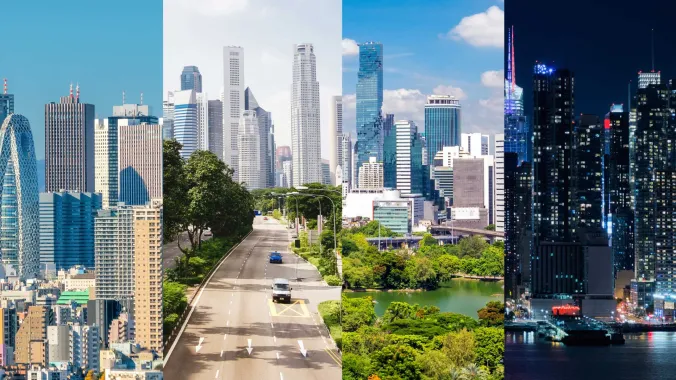Course Info
6 video lessons (56 Mins)
Published
2020-
4.38
Preview Course
Browse Course Chapters
-
1.Introduction
5 mins
-
2.Smart Urbanism
9 mins
-
3.A Changing Climate: What it Means for the Future City
14 mins
-
4.A Non-Western World: The Future City in the Global South
14 mins
-
5.Looking Upstream: Policy Fixes for the Future City
7 mins
-
6.Conclusion
4 mins
What You Will Learn
- Understand the evolution of contemporary planning by comparing previous movements and the origins of modern design, social reform, policies ,and politics.
- Identify key global shifts in the cultural, economic, political, and industrial relationships and hierarchies between and across different cities.
- Recognize how city planning as a discipline emerged from the ideas of writers, politicians, architects, designers, and social reformers.
- Compare and contrast the ways that technology and innovations change cities and the way planners must plan for cities, from the aqueduct to the railroad and the automobile and looking into the future to consider the implications of automation, robotics, and artificial intelligence.
- Critically evaluate how historical planning movements were successful (and we still borrow from them) but also how they failed, and how and why some cities rose while others fell. This is especially important in understanding and reckoning with the "City of Tomorrow."
- Recognize and assess the relationships between planning, the economy, politics and society—the way that industrial innovation gave rise to revolutions and transformative social movements, and make links to the contemporary urban world.
Course Description
"History of City Planning 5: The City of Tomorrow," the fifth and final course in the "History of City Planning" series looks to the future. Course instructor Jason Luger, lecturer in City and Regional Planning at U.C. Berkeley, concludes this series of city planning courses tracing the history of urban planning. This course considers lessons learned from the urban past and the current challenges facing cities trying to look forward or "upstream".
More than half of the world’s population is "urban," according to the United Nations, and this proportion will continue to increase. In the future, much of the increase of urban populations will be focused in the non-West, in places like South Asia and Africa. Current and future challenges, like climate change, environmental injustice, socio-political unrest and division, and the rise of robots and artificial intelligence, are all real, crucial, time-sensitive, and must be addressed by city planners.
The previous four city planning courses in "History of City Planning" reviewed how city planning evolved into what it is today. This course evaluates the key challenges facing cities in the future and, importantly, some potential solutions for those challenges. Cities are both the cause of many of the world’s problems and the focal points for best practices, innovation, and even sustainability. No matter what form the future takes, it will most certainly be urban.
This course considers the impact of climate change on cities and what cities in the Global South can learn from urban planning mistakes in the Global North. Students will also consider how the smart city has opened pathways for planning to become more democratic while at the same time leaving a new urban patchwork of economic and social winners and losers. City planning is crucial to an urban future, and the success of future cities will depend on the extent to which they are sustainable, equitable, and how they use technology to serve their citizens.
Learn these skills
- History
- Land Use
- Plan Making
- Technology
- Transportation
- Urban Design
AICP CM
This course is approved for 1 AICP CM credit.
AIA CES
This is 1 LU.CNU-A
SACPLAN CPD
This course is approved for 1 SACPLAN CPD point.



























